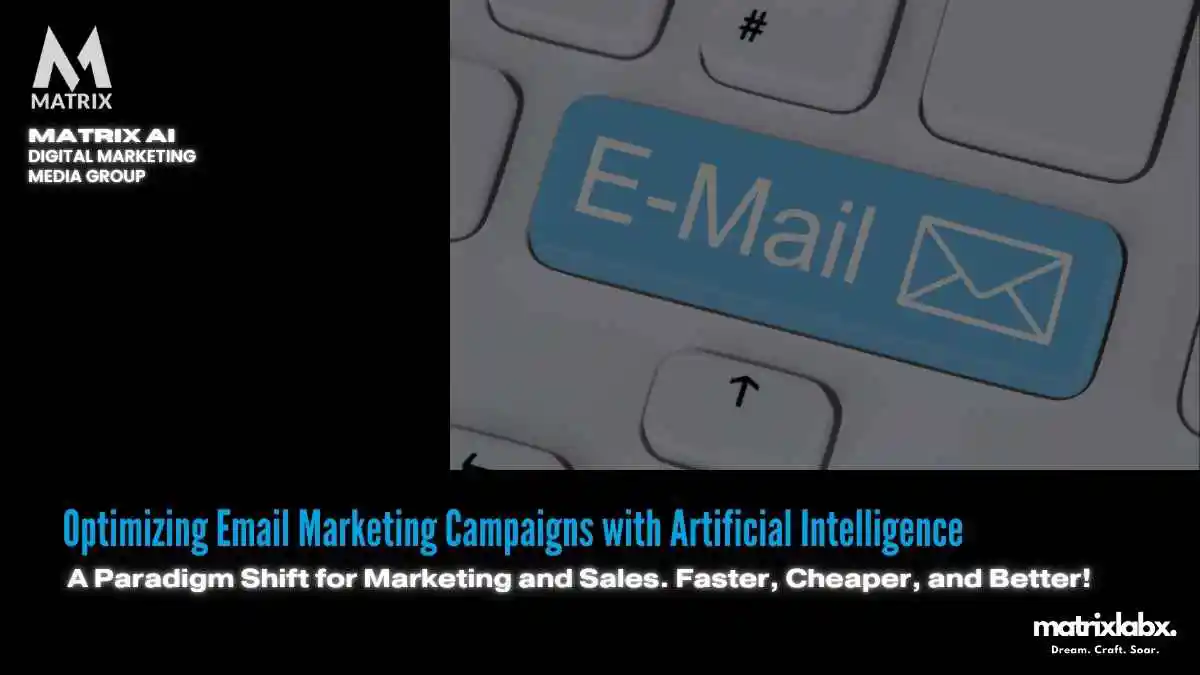Optimizing Email Marketing Campaigns with Artificial Intelligence.
Learn About Optimizing Email Marketing Campaigns with Artificial Intelligence.
Introduction
The digital landscape has undergone a transformative shift in the past decade, particularly in how businesses engage with customers. A staggering statistic from Statista reveals that the number of email users globally has surged to over 4 billion in 2020 and is projected to grow to 4.6 billion by 2025.
This exponential increase underscores the burgeoning relevance of email as a potent marketing tool. However, with millions of emails sent every minute, the challenge of cutting through the noise and capturing consumer attention has never been more daunting.
Email marketing, once a straightforward means of communication, has evolved into a complex domain requiring strategic insight and technological acumen. Traditionally, marketers relied on broad segmentation and basic content personalization strategies.
However, these methods are rapidly becoming obsolete in an era where consumers expect highly personalized and relevant interactions. The effectiveness of an email marketing campaign now hinges on the ability to precisely tailor messages to the nuanced preferences of diverse customer segments.
The advent of artificial intelligence (AI) offers transformative potential for email marketing. AI technologies enable deeper data insights, predictive analytics, and automated content personalization, revolutionizing campaigns’ development and execution.
By integrating AI, marketers can dynamically customize email content, optimize send times, and enhance overall campaign performance, ensuring that each communication resonates with the recipient.
This paper explores the pivotal role of AI in optimizing email marketing campaigns. By leveraging machine learning algorithms and data analytics, marketers can transcend traditional barriers, achieving unprecedented engagement and efficiency.
This study will demonstrate, through detailed analysis and case studies, that the integration of AI not only refines the execution of email campaigns but is fast becoming an indispensable tool in the marketer’s arsenal.
Thus, the thesis asserts that Optimizing Email Marketing Campaigns with Artificial Intelligence is not merely an option but an essential strategy in the digital marketing playbook.
The Evolution and Optimization of Email Marketing
The Shifting Digital Landscape and the Resurgence of Email
- Transformative Shift: The past decade has significantly changed how businesses interact with customers online.
- Email’s Enduring Relevance:
- Surging User Base: Statista data indicates a global increase in email users to over 4 billion in 2020, with projections reaching 4.6 billion by 2025.
- Potent Marketing Tool: This growth highlights email’s continued importance as a marketing channel.
- The Challenge of Noise: The sheer volume of emails sent necessitates strategies to capture consumer attention.
The Maturation of Email Marketing
- From Simple Communication to Complex Domain: Email marketing has evolved beyond basic messaging, requiring strategic thinking and technical expertise.
- Limitations of Traditional Methods: Broad segmentation and basic personalization are becoming less effective.
- Demand for Personalized Interactions: Modern consumers expect highly tailored and relevant communication.
- Importance of Nuanced Targeting: Successful campaigns now depend on precisely tailoring messages to specific customer preferences.
The Transformative Potential of Artificial Intelligence (AI)
- AI as a Game Changer: The emergence of AI offers significant opportunities to revolutionize email marketing.
- Key AI Capabilities:
- Deeper Data Insights: AI can analyze data more effectively to understand customer behavior.
- Predictive Analytics: AI can forecast future trends and customer preferences.
- Automated Content Personalization: AI can automatically tailor email content to individual recipients.
- Benefits of AI Integration:
- Dynamic Content Customization: AI enables real-time personalization of email content.
- Optimized Send Times: AI can determine the best email times for maximum engagement.
- Enhanced Campaign Performance: AI improves email campaigns’ overall effectiveness and results.
- Increased Message Resonance: AI helps ensure each communication is relevant to the recipient.
The Pivotal Role of AI in Optimizing Email Marketing Campaigns
- Focus of the Paper: This study examines the crucial role of AI in improving email marketing efforts.
- Leveraging Advanced Technologies: Machine learning algorithms and data analytics enable marketers to overcome traditional limitations.
- Achieving Unprecedented Engagement and Efficiency: AI facilitates higher levels of customer interaction and more efficient campaign execution.
- Demonstrating AI’s Impact: The paper will showcase the benefits of AI integration through analysis and case studies.
- AI as an Indispensable Tool: The study argues that AI is rapidly becoming a necessary component of the modern marketer’s toolkit.
- Thesis Statement: Optimizing Email Marketing Campaigns with Artificial Intelligence is not merely an option but an essential strategy in the digital marketing playbook.
Struggling to Keep Up with Content Demands?
In today’s digital landscape, creating consistent, high-quality content is more challenging—and more important—than ever. Without a clear plan and the right tools, your brand risks falling behind in the crowded marketplace.
Imagine you’re a seasoned chef in a bustling kitchen. Each dish you prepare is tailored to the tastes and preferences of your patrons, crafted with precision to ensure satisfaction and keep them coming back.
Now, imagine if you had a sous chef who not only anticipated every need but also had an encyclopedic knowledge of every guest’s favorite ingredients and how those ingredients interact to create the perfect meal. That’s what optimizing your email marketing campaigns with artificial intelligence is.
AI in email marketing functions much like this intuitive sous-chef, using data from past campaigns to predict what your customers want, when they want to read it, and how it should be presented to them. It analyzes patterns and behaviors, learning to refine its suggestions over time, ensuring each message is as engaging and effective as possible.
By integrating AI, you can send emails and deliver a personalized dining experience that meets each recipient’s unique tastes, increasing satisfaction and loyalty.
Just like a masterful dish that leaves guests longing for more, AI-powered campaigns drive engagement and conversions, keeping your brand at the top of the menu in the crowded restaurant that is their inbox.
AI Integration in Marketing
Nearly 60% of marketers now rely on AI to streamline processes, generate content, and analyze data, a trend expected to grow in 2025, underscoring the role of AI-driven DMaaS platforms in modern marketing strategies. See pricing.
Case Study and Stories
Case Study 1: Retail Brand – Fashion Forward
Brand Description and Initial Planning and Strategy:
Fashion Forward is a mid-sized online retailer specializing in women’s apparel and accessories.
Recognizing the competitive nature of the fashion industry, the marketing team set out to enhance their email marketing strategy to increase customer engagement and drive sales.
Initially, their email campaigns relied heavily on broad segmentation based on demographics and previous purchases.
They planned to use a traditional approach, focusing on weekly newsletters and promotional blasts.
Leveraging AI to Optimize Campaigns:
Fashion Forward decided to integrate an AI-powered email marketing platform to refine its campaigns. It utilized machine learning algorithms to analyze customer behavior, preferences, and purchasing patterns.
The AI system enabled Fashion Forward to segment its audience more accurately, allowing for personalized email content tailored to individual preferences.
Instead of sending generic promotional emails, Fashion Forward began implementing dynamic content. The emails would display products aligned with each recipient’s past behavior.
They also experimented with AI-facilitated A/B testing, which allowed them to continuously optimize subject lines, send times, and content layouts based on real-time data.
Mitigating Failures:
In the early stages, Fashion Forward faced challenges with data integration, leading to inaccurate customer profiles.
To address this, they employed a dedicated data-cleaning strategy to ensure their datasets were accurate and up-to-date.
They also learned to adjust their strategy quickly, dropping campaigns that did not perform well based on AI feedback.
Lessons Learned:
- Personalization is Key: By leveraging AI, the brand learned that personalized emails significantly increased open rates and conversions compared to generic content.
- Data Quality Matters: Maintaining high-quality data is crucial. Investing in data cleaning and management ensures AI tools can work effectively.
- Continuous Testing and Optimization: The ability to A/B test in real time allowed Fashion Forward to refine its campaigns and consistently improve overall performance.
Content That Converts: Transparent Pricing for Maximum ROI
Explore Matrix Marketing Group’s Flexible Pricing Plans for Premium Content and Marketing Solutions Tailored to Your Goals.
Case Study 2: Travel Brand – Wanderlust Travel Agency
Brand Description and Initial Planning and Strategy:
Wanderlust Travel Agency is a boutique travel service that curates personalized travel experiences for its clients.
Its email marketing strategy was initially focused on sending out monthly newsletters featuring travel tips, destination highlights, and package deals.
However, they noticed low engagement and high unsubscribe rates, indicating that their audience wasn’t finding the content relevant.
Leveraging AI to Optimize Campaigns:
To revitalize their email marketing, Wanderlust implemented an AI-driven email automation tool.
They began by utilizing predictive analytics to understand which destinations were trending based on user interactions, social media trends, and seasonal travel data.
This information was used to personalize the email content based on subscribers’ previous inquiries and interests.
Furthermore, they introduced automated drip campaigns that nurtured leads by sending tailored emails based on their travel planning stages.
For example, potential clients interested in tropical vacations would receive emails highlighting travel tips, best destinations, and special offers related to tropical travel.
Mitigating Failures:
Initially, Wanderlust faced challenges with the timing and frequency of their emails. Some clients reported feeling overwhelmed by too many emails.
By leveraging AI to analyze engagement metrics, the agency could adjust the frequency and optimize send times based on when recipients were most likely to open their emails, thereby reducing unsubscribe rates.
Lessons Learned:
- Know Your Audience: Using AI to gain insights into customer behavior helped Wanderlust better understand its audience and create content that resonated with its interests.
- Automate Thoughtfully: Automating email sequences based on the customer journey provided a more meaningful engagement without overwhelming subscribers.
- Monitor Engagement Metrics: Analyzing engagement data allowed Wanderlust to fine-tune its email strategy and ensure it effectively met its audience’s preferences.
Both Fashion Forward and Wanderlust Travel Agency demonstrate the transformative potential of AI in optimizing email marketing campaigns.
By embracing data-driven insights and personalizing content, brands can significantly enhance engagement and drive conversions.
The key takeaways for any business looking to optimize their email marketing efforts include data quality, the necessity for personalization, and the value of continuous testing and adaptation.
Shifting from Lead Generation to Revenue Generation: A New Era for Marketing Managers
Unlocking 67% More Revenue: The Shift Every Marketing Manager Needs to Make
In today’s fast-paced digital landscape, marketing managers are bombarded with new strategies and tools claiming to revolutionize their approach. This statistic is not just a number—it’s a call to action for marketing leaders to reevaluate their strategies and realign their efforts with the bottom line. Schedule an appointment.
Challenges and Opportunities in Optimizing Email Marketing Campaigns with Artificial Intelligence
In the rapidly evolving digital marketing landscape, optimizing email marketing campaigns by applying artificial intelligence (AI) presents significant challenges and promising opportunities.
Understanding these dynamics is essential for marketers seeking to enhance their strategies and achieve greater engagement and conversion rates.
Challenges
- Data Privacy and Compliance: As regulations like GDPR and CCPA become more stringent, marketers face challenges in responsibly collecting and utilizing consumer data. AI relies heavily on data to optimize campaigns, and navigating these legal frameworks while respecting user privacy is crucial.
- Integration with Existing Systems: Implementing AI tools often requires integrating existing marketing platforms and CRM systems. This can be a complex process that demands technical expertise and may disrupt current workflows.
- Data Quality: AI’s effectiveness highly depends on the data quality it processes. Poor data quality—such as outdated lists or incomplete customer profiles—can lead to inaccurate predictions and ineffective campaign strategies.
- Understanding AI Outputs: While AI can provide sophisticated insights and recommendations, many marketers may struggle to interpret these outputs effectively. This gap in understanding can lead to underutilization of AI capabilities and missed opportunities for optimization.
- Cost of Implementation: Investing in AI technology can be a significant financial commitment, particularly for small to mid-sized businesses. The costs associated with software, training, and ongoing maintenance can be barriers to entry.
Opportunities
- Personalization at Scale: AI enables marketers to analyze vast amounts of data to create highly personalized email experiences. By understanding customer behavior and preferences, brands can tailor content, recommendations, and offers that resonate with individual recipients, driving higher engagement rates.
- Predictive Analytics: AI algorithms can analyze historical data to predict future customer behavior, allowing marketers to segment audiences more effectively and time their campaigns for maximum impact. This predictive capability can enhance customer targeting and improve conversion rates.
- Automated A/B Testing: AI can streamline the process of A/B testing by automatically testing different subject lines, content variations, and send times. This allows marketers to efficiently identify what works best for their audience, optimizing campaign performance without manual intervention.
- Enhanced Customer Insights: AI tools can provide deeper insights into customer preferences and trends, helping marketers to make data-driven decisions. Understanding customer journeys through AI analysis allows for better alignment of email content with user needs and behaviors.
- Improved Deliverability: AI can help optimize send times and manage recipient engagement, leading to better email deliverability rates. By analyzing engagement patterns, AI can suggest the best times to send emails to maximize open rates and minimize unsubscription.
Your Blueprint for SEO Success in 2025
Whether you’re a business owner, marketer, or seasoned SEO professional, this guide is tailored to give you a competitive edge in the evolving digital landscape. Get SEO Pricing.
Importance of Optimizing Email Marketing with AI
The importance of optimizing email marketing campaigns with AI cannot be overstated. In an era where consumers are inundated with emails, standing out requires precision and relevance. AI provides the tools to enhance personalization, predict customer needs, and automate processes that traditionally consumed significant time and resources.
Moreover, leveraging AI for email marketing can be a critical differentiator as competition intensifies across digital channels. Brands that effectively harness AI-driven insights can improve their return on investment (ROI), foster stronger customer relationships, and drive sales. In an increasingly data-driven world, the ability to adapt and optimize marketing strategies through AI will be essential for success.
By understanding the challenges and seizing the opportunities presented by AI, marketers can enhance their email marketing campaigns and contribute to their businesses’ overall growth and sustainability.
Matrix Marketing Group is at the forefront of integrating artificial intelligence into digital marketing strategies, particularly optimizing email marketing campaigns.
The article “Optimizing Email Marketing Campaigns with Artificial Intelligence” highlights AI’s transformative power in personalizing content, predicting customer behavior, and improving engagement rates. Matrix Marketing Group leverages these AI capabilities to help businesses craft tailored email campaigns that resonate with their target audience.
By utilizing advanced algorithms, Matrix Marketing Group can analyze vast amounts of data to identify trends and preferences, enabling marketers to send the right message at the right time. Their AI-driven approach ensures that email campaigns are timely and relevant, significantly increasing open and conversion rates. The agency’s expertise in segmentation allows for precise targeting, ensuring that each subscriber receives personalized content that speaks directly to their interests and needs.
Furthermore, Matrix Marketing Group’s AI tools, like AISEOPad and AIOContentPad, continuously learn from campaign performance, allowing for ongoing optimization and refinement.
This iterative process helps brands stay ahead in the competitive digital landscape, ensuring their email marketing efforts yield maximum ROI. With Matrix Marketing Group, businesses can harness AI’s full potential to create impactful email marketing strategies that drive results and foster lasting customer relationships.
Optimizing email marketing campaigns with artificial intelligence is no longer a futuristic concept but a present-day necessity.
We explored how AI-driven tools enhance personalization, automate segmentation, and improve predictive analytics, enabling marketers to craft more targeted and effective campaigns. By leveraging AI, businesses can analyze vast data to understand customer behaviors and preferences, resulting in higher engagement rates and conversion.
The central thesis of this article underscores that integrating AI into email marketing streamlines processes and elevates the overall customer experience. Adopting these innovative strategies will be crucial for staying ahead in an increasingly competitive digital landscape.
As you contemplate the future of your email marketing efforts, consider this: Are you ready to harness the power of AI to unlock new levels of engagement and growth?
Embrace technology and turn your campaigns into personalized experiences that resonate deeply with your audience. The future of marketing is here—don’t get left behind.







